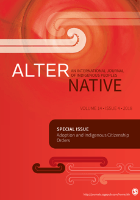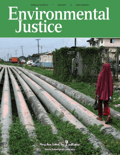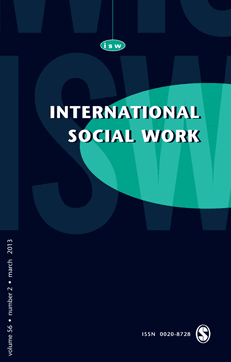
Alternative-An International Journal of Indigenous Peoples
Scope & Guideline
Exploring the Rich Tapestry of Indigenous Narratives
Introduction
Aims and Scopes
- Indigenous Rights and Sovereignty:
Explores the legal, social, and political dimensions of Indigenous peoples' rights, focusing on self-determination, land rights, and sovereignty issues. - Cultural Resilience and Revitalization:
Investigates the ways in which Indigenous communities maintain, reclaim, and innovate their cultural practices, languages, and traditions in contemporary contexts. - Decolonization and Indigenous Methodologies:
Promotes research frameworks that prioritize Indigenous knowledge systems and methodologies, challenging colonial narratives and practices. - Health and Well-being:
Addresses health disparities faced by Indigenous populations, integrating traditional healing practices with contemporary health care systems. - Environmental Justice and Sustainability:
Focuses on the intersection of Indigenous rights with environmental issues, emphasizing sustainable practices rooted in Indigenous knowledge. - Technology and Digital Inclusion:
Examines the role of technology in facilitating Indigenous voices and cultural expression, as well as the challenges related to digital divides. - Education and Capacity Building:
Analyzes educational systems and practices that empower Indigenous youth and communities, advocating for culturally relevant curricula and pedagogies. - Social Justice and Activism:
Highlights the activism and advocacy efforts of Indigenous peoples, addressing systemic inequalities and promoting social justice initiatives.
Trending and Emerging
- Intersectionality in Indigenous Studies:
An increasing focus on the interplay of various identities within Indigenous communities, such as gender, sexuality, and disability, highlights the need to address diverse experiences and challenges. - Climate Change and Indigenous Responses:
There is a growing emphasis on Indigenous perspectives regarding climate change, showcasing adaptation strategies and resilience practices that are rooted in traditional knowledge. - Digital Activism and Online Communities:
The rise of digital platforms for Indigenous expression and activism is a significant trend, with research exploring how technology facilitates community engagement and cultural preservation. - Indigenous Youth Empowerment:
A notable increase in studies dedicated to the empowerment and leadership roles of Indigenous youth, reflecting a commitment to future generations and their agency in community development. - Health Equity and Traditional Healing:
Emerging themes focus on integrating traditional healing practices with contemporary health care systems, emphasizing holistic approaches to health and well-being. - Indigenous Economic Development and Entrepreneurship:
Research is increasingly addressing the role of Indigenous entrepreneurship and economic initiatives as pathways to self-determination and community resilience.
Declining or Waning
- Traditional Ecological Knowledge (TEK):
While TEK remains important, its representation in recent publications has decreased, suggesting a potential shift towards integrating Indigenous knowledge with contemporary scientific practices rather than focusing solely on traditional practices. - Historical Narratives and Colonial Histories:
Research centered on historical accounts of colonization and its impacts appears to have waned, possibly as the journal shifts towards contemporary issues and solutions rather than historical grievances. - Indigenous Arts and Literature:
Themes specifically dedicated to Indigenous arts and literary analysis have seen reduced frequency in recent publications, perhaps indicating a broader focus on practical applications of Indigenous knowledge rather than purely artistic expressions.
Similar Journals

Revista Brasileira de Historia
Unveiling the Past, Shaping the FutureRevista Brasileira de Historia, published by the ASSOC NAC HISTORIA-ANPUH, stands as a pivotal platform for the dissemination of historical scholarship within the Brazilian context and beyond. With an open access policy since 1997, this journal welcomes contributions that enhance understanding in various intersecting fields, such as Cultural Studies, Geography, and Sociology. The journal is recognized for its quality, evidenced by its ranking in established academic quartiles, including Q2 in History, making it a significant resource for historians and social scientists alike. Covering a span of converged years from 1999, 2001, and 2007 to 2024, Revista Brasileira de Historia enriches the scholarly dialogue by providing accessible research that fosters critical engagement with Brazil's historical narratives. Researchers, professionals, and students interested in the dynamic interactions between history and society will find this journal an indispensable resource.

Debates en Sociologia
Empowering Interdisciplinary Connections in the Social SciencesDebates en Sociologia is a prominent peer-reviewed journal that serves as a vital platform for sociological discourse and research in the Latin American context. Published by the Pontificia Universidad Católica del Perú, this esteemed journal has embraced an Open Access model since 2005, ensuring that scholars and policymakers have unrestricted access to its rich array of articles advancing contemporary sociological thought and practice. The journal encourages submissions that stimulate critical discussions about social issues, offering a space for innovative research, theoretical explorations, and empirical studies. With its ISSN 0254-9220 and E-ISSN 2304-4284, Debates en Sociologia is committed to enhancing the visibility of research in sociology, thus making significant contributions to both regional and global academic dialogues. Its dedication to fostering interdisciplinary connections within the social sciences highlights the journal's importance for researchers, professionals, and students seeking to expand their understanding of sociological phenomena.

Alternative Law Journal
Fostering Critical Discourse for a Just Society.Alternative Law Journal, published by SAGE Publications Ltd, stands as a pivotal platform for critical discourse within the fields of law, sociology, and political science. Since its inception in 2008, the journal has fostered innovative scholarship aimed at exploring the intersections of legal practices and social justice, making it an essential resource for researchers, practitioners, and students alike. With its current ranking at Q3 in both the Law and Sociology categories according to the latest Scopus metrics, the Alternative Law Journal ensures a robust academic discourse, promoting diverse perspectives and challenging conventional norms. The journal's address reflects its international reach, further underscoring its commitment to fostering a global dialogue on pressing legal and societal issues. This journal is crucial for anyone seeking to stay updated with contemporary thoughts and research impacting law and society.

Environmental Justice
Championing social justice in the face of environmental challenges.Environmental Justice is a leading interdisciplinary journal published by MARY ANN LIEBERT, INC that provides a vital platform for the exploration of environmental issues through the lens of social equity and justice. With a strong focus on the intersection of geography, health, and policy, this journal spans topics from spatial inequality to public health implications related to environmental risks. Since its inception in 2008, the journal has gained recognition, achieving a Q1 ranking in Geography, Planning, and Development and a Q2 ranking in both Health, Toxicology, and Mutagenesis as well as Management, Monitoring, Policy, and Law. The journal is an essential resource for researchers, policymakers, and practitioners alike, reflecting the increasing importance of environmental justice in addressing global challenges. Although it does not operate under an open-access model, the comprehensive insights published in Environmental Justice are instrumental for advancing scholarly discourse and practical applications in the field.

INTERNATIONAL SOCIAL WORK
Elevating Social Work: Research, Practice, ImpactINTERNATIONAL SOCIAL WORK, a leading journal published by SAGE PUBLICATIONS LTD, offers an essential platform for disseminating high-quality research and practices in the field of social work and social sciences. With a strong impact factor and a distinguished presence in the Q1 quartile ranking for Social Sciences, Social Work, and Sociology and Political Science, this journal has established itself as a key resource for academics, practitioners, and students alike. The journal welcomes diverse perspectives and innovative approaches to social issues, promoting critical discussions and evidence-based solutions. Since its inception in 1959, INTERNATIONAL SOCIAL WORK has committed to enhancing professional practice and advancing theoretical developments, making it indispensable for anyone dedicated to research and practice in international social work. Readers can access current and past issues, which together reflect the journal's ongoing contribution to the field and its commitment to fostering global dialogue on social justice and welfare.

Aboriginal Policy Studies
Exploring the Complexities of Aboriginal GovernanceAboriginal Policy Studies is a pioneering open-access journal published by the University of Alberta that has been dedicated to the examination of issues, policies, and practices affecting Aboriginal communities in Canada and beyond since 2011. With its ISSN 1923-3299, this journal serves as a vital platform for researchers, professionals, and students committed to advancing knowledge and understanding of Indigenous rights, governance, and social justice. The journal aims to foster interdisciplinary discourse by publishing high-quality original research, critical analyses, and case studies that address the complexities of Aboriginal policy. Given its commitment to accessibility and rigor, Aboriginal Policy Studies is an essential resource for anyone engaged in the fields of sociology, political science, and Indigenous studies, striving to amplify Indigenous voices within scholarly dialogue.

NAIS-Native American and Indigenous Studies Association
Fostering Critical Conversations on Indigenous KnowledgeNAIS-Native American and Indigenous Studies Association is a pivotal journal dedicated to the exploration and advancement of knowledge surrounding Native American and Indigenous studies. Published by University of Minnesota Press, this journal offers a platform for interdisciplinary scholarship that prioritizes Indigenous voices and perspectives across a variety of contexts. Although it operates under a traditional access model, the journal remains committed to disseminating high-quality research that challenges dominant narratives and emphasizes the importance of Indigenous knowledge systems. With a focus on contemporary issues, cultural practices, and historical insights, NAIS serves as an essential resource for researchers, professionals, and students passionate about Indigenous studies. Its aim is to foster critical conversations and promote understanding of Indigenous experiences in a rapidly changing world, thus fulfilling a vital role in academia and beyond.

Novos Cadernos NAEA
Fostering open access to groundbreaking research since 1998.Novos Cadernos NAEA is a prominent open-access journal published by Universidade Federal do Pará, dedicated to advancing the field of applied social sciences and environmental studies. Since its inception in 1998, this journal has established itself as a vital platform for researchers and practitioners to disseminate innovative research, engage in scholarly conversations, and promote interdisciplinary approaches to contemporary issues affecting society and the environment. With an ISSN of 1516-6481 and an E-ISSN of 2179-7536, it aims to enhance accessibility to knowledge by ensuring that all articles are freely available online, thereby supporting the global academic community. The journal's commitment to quality research is evident, making it an essential resource for scholars, students, and policymakers looking for cutting-edge analysis and insights in their fields.

Aotearoa New Zealand Social Work
Empowering practitioners, shaping futures.Aotearoa New Zealand Social Work is a pivotal journal dedicated to advancing the practice and scholarship of social work within Aotearoa New Zealand and beyond. Published by the Aotearoa New Zealand Association of Social Workers, this peer-reviewed journal serves as an essential platform for researchers, practitioners, and students, fostering a community committed to enhancing social well-being and addressing social justice issues. With a focus on local and global social work practices, it aims to disseminate innovative research, case studies, and critical discussions that shape the future of the profession. Although the journal operates under a traditional access model, its contributions are invaluable to scholars and professionals seeking to bridge theory and practice in the field. As an emerging publication within its category, Aotearoa New Zealand Social Work plays a critical role in informing policy and practice, ultimately enriching the social work landscape in New Zealand and providing a model for similar contexts globally.

Droit et Cultures
Advancing Interdisciplinary Dialogue in Law and SocietyDroit et Cultures is a prestigious academic journal published by EDITIONS L HARMATTAN, which has been a vital platform for interdisciplinary exploration in the fields of law, culture, and social sciences. Since its inception, the journal has embraced an Open Access model since 2004, ensuring that a wide audience can engage with and benefit from its scholarly content. Based in the heart of Paris, France, this international journal provides a forum for researchers, professionals, and students to address emerging issues at the intersection of legal frameworks and cultural contexts. Although the specifics regarding its HIndex and Scopus ranks are currently unavailable, the journal's commitment to contributing to academic discourse remains paramount. With a diverse scope that encompasses legal theory, cultural studies, and socio-legal perspectives, Droit et Cultures signifies an essential resource for anyone seeking to deepen their understanding of the dynamic interplay between law and culture.